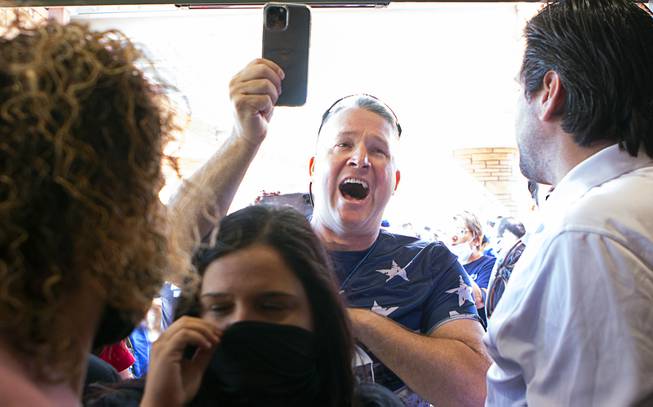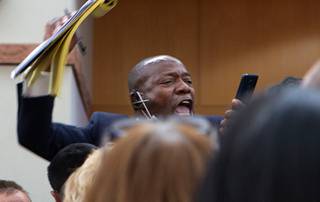
A man yells and takes video on his phone after being removed from a commission meeting at the Clark County Government Center Tuesday, Sept. 21, 2021.
Sunday, Feb. 20, 2022 | 2 a.m.
A commenter waited through three hours of a routine Clark County Commission meeting last week to speak during the public comments portion at the end.
Once he had the floor, he calmly started to recite a litany of untruths about the COVID-19 vaccine: that vaccine manufacturer Pfizer admitted its shot was ineffective, that it gives young boys fatal heart attacks, that it causes positive HIV tests.
“This is nuts,” he said.
Nevada’s mask requirement was lifted two weeks ago, but the pushback on pandemic protocols by way of public comment at local government meetings wasn’t. With that, neither is the misinformation that often accompanies it.
Emma Bloomfield, a UNLV communications professor who studies anti-science and conspiracy movements and how misinformation travels on social media, said events like the pandemic “puncture public discourse.” The virus has affected every part of our experience, more than new stop signs or other neighborhood development that local governments get feedback on before putting into place.
“Events like pandemics amplify these spaces as sites of misinformation, but I think they’ve always been outlets for it,” Bloomfield said. “Any new mandate or policy that gets passed can be met with concern from parents and members of the public on the impacts of those changes.”
Bloomfield and Sung-Yeon Park, a public health professor at UNR, agree that outrage against the government isn’t likely to dissipate just because masks, one of the key divisive measures imposed during the pandemic, have been eliminated as a requirement.
“They have an infrastructure now,” said Park, who studies health-related media messages and their effects on audiences. “They have a ready network of people who can be mobilized and at a moment’s notice.”
Petitioning the government is a protected First Amendment exercise, and local government meetings build in opportunities for members of the public to do so. The public comment period has been elevated over the last two years to air pandemic grievances, regardless of whether the governing body has much direct control over mitigation measures.
It’s also fertile ground for viral moments in many cities across the nation.
Take the man who screamed at the San Diego County Board of Supervisors in August about vaccine passports being fascist and opening “the pits of hell.” Or the nurse who told the Ohio House of Representatives committee in June that the vaccine made her magnetic, while attempting to demonstrate by pressing a key and bobby pin against her skin as the objects slid off her body.
Clark County hasn’t generated such searing moments. But last year, when the county reimposed a mask mandate on people at work in indoor public spaces, more than 50 people attended the midday meeting. They were overwhelmingly against the requirement, or as one man quipped: “Masks probably work as good as a whiffle ball as a condom.”
In September, the Clark County Commission passed a resolution declaring misinformation over COVID vaccines a public health crisis. That position statement, which did not give the county authority to punish people expressing a different message, triggered fury over a feared “tyrannical” and “communist” government that wants to harm, even kill, its citizens via inoculation, or launch rebellion and “bloodshed on the streets of Las Vegas,” one commenter said.
At the meeting about misinformation, another woman said that if she put her mask in boiling water, insect-like animals would crawl out.
Park said people were motivated by claims they have seen online and come to local meetings angrier and emboldened by the sense that people agree with them.
Talking points come from well-honed influencers and organizations that appeal to a longstanding lack of trust in institutions and authority, she said. People who accept them aren’t necessarily uneducated or irrational.
“Misinformation and disinformation has been really sophisticated to find a way to stick to people who are normally reasonable,” she said.
Remaining pandemic issues, like employer vaccine mandates, may absorb people’s energy as they continue to take the public comment stand, Bloomfield said.
“Anywhere that people see their personal liberties still being restricted by the pandemic could likely be targets,” she said.

